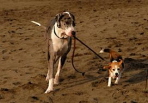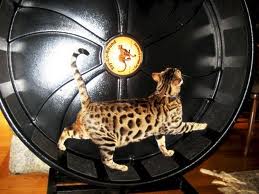Why are too many carbohydrates a problem for pets? Carbohydrates convert to sugar and can lead to yeast, diabetes and even cancer. While protein and fats are slow to be digested, the sugar from carbohydrates are quickly absorbed into the bloodstream, spiking (and then dropping) insulin-making pets hungry faster. Most notably, too many carbohydrates can affect immunity and worsen autoimmune disorders. Cats are carnivores and thrive on a high protein diet. Many cat owners whose kitties have autoimmune disorders (such as stomatitis) are feeding their cats dry food not realizing that the carbohydrates in the food may be worsening their cat's condition---the carbohydrates convert to sugar feeding the bacteria in the mouth. Carbohydrates and cat health is an important issue to consider when choosing a diet for your cat.
Is your dog always acting starved? Could be that your dog is eating a kibble diet loaded with carbohydrates. Consider a raw frozen diet or mixing in a higher protein canned food and reducing the overall carbohydrates. Visit AskAriel.com for more pet nutrition tips!
1) Add More Protein When a pet is constantly begging, it could be that they are not getting enough protein. Think about it---when you eat too many carbohydrates--what happens?---you crave more carbs. While dogs and cats are natural scavengers, some pets seem to be ravenous. Check the ingredients on your pet's food label. There may be too many carbohydrates in the form of grains, potatoes or peas. Carbohydrates are heavily used EVEN IN GRAIN-FREE DIETS to keep manufacturing costs down. If your pet does not have a medical need for a reduced protein diet, switch to a high protein, raw or canned diet. You will need to reduce the overall amount of food you were giving previously as pet foods with fillers often recommend much larger quantities.
2) Carefully Measure Food Amounts— “Guesstimating” how much is in a cup can lead to obesity. Many scoops are actually two cups not one.
3) Feed At Least Two or Three Smaller Meals-Small meals regulate your pet's blood sugar and improve digestion. We do not recommend FREE feeding. This is a common practice especially in multi-cat households because some pets end up overeating while others undereat. Use a small amount of pumpkin or add some green vegetables to help your pet feel more satiated.



